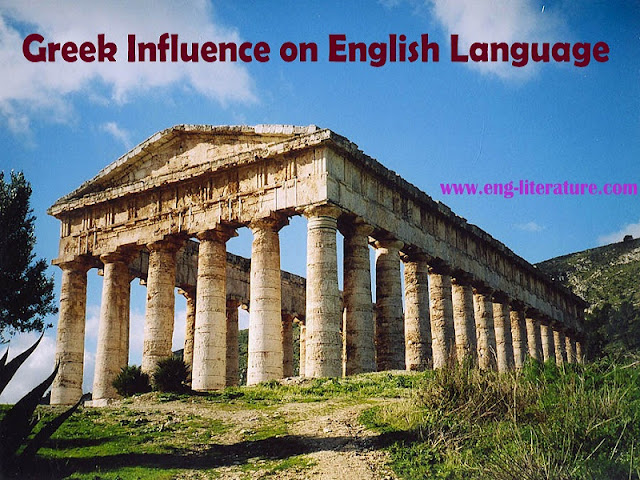The revival of Greek learning
in Western Europe at the beginning of 16th century opened up a new
vista (i.e. Greek) from which the English vocabulary was greatly enriched. But
the pre-Renaissance period was not altogether blank of Greek borrowings.
Further in the hands of able writers and thinkers like Socrates, Plato, Aristotle,
Homer, Aeschylus, Euripides, Sophocles, the potentialities of this language for
expressing accurate distinction have been cultivated to the highest point.
Long before the Renaissance
English contained a certain number of Greek words, such as ‘geography’,
‘theology’, ‘logic’, ‘academy’, ‘Bible’, ‘harmony’, ‘ecstasy’, ‘diphthong’,
‘nymph’ ‘poetry’, ‘theatre’, ‘tragedy’, ‘tyrant’ etc.
The contributions of Greek to
the English vocabulary mainly consist and in the supply of technical and
scientific terms. Names of almost all sciences have come from Greek, such as
biology, anthropology, zoology, botany, chemistry, physics, mathematics,
astrology, astronomy etc. Medical science has taken a large number of words
from Greek such as ‘psychology’ (mind), ‘neurology’ (nerve), ‘hepatic’ (liver),
‘cardiology’ (heart), ‘phlebotomy’
(vein), ‘nephrology’ (kidney), ‘diagnosis’, ’tuberculosis’, ‘symbiosis’, ‘clinic’,
‘larynx’ etc. Many technical terms have been made by putting together two Greek words e.g. ‘telegram’,
‘telephone’, ‘phonograph, ‘photography’, ‘lithography’, ‘ophthalmoscope’,
‘microscope’, ‘telescope’ etc.
According to Margaret
Schlauch “Classical Greek made a special contribution to English in connection
with the study of grammar and rhetoric.” The words ‘grammar’ and
‘rhetoric’ derive from Greek language. Other significant words in this class
are ‘parenthesis’, ‘anaphora’, ‘irony’, ‘climax’, ‘bathos’, ‘elegy’,
‘antithesis’, ‘oxymoron’, ‘protagonist’ etc.
Sometimes hybrids have been
made by adding Greek suffixes and prefixes to English words. Thus the Greek
prefixes ‘anti-‘ (antisocial), ‘hyper-‘ (hyper-sensitivity) ‘infra-‘
(infrared), ‘a-‘ (amoral) have been joined to many English words. The Greek
suffix ‘-ology’ has been added to words of Latin English origin as in
‘sociology’.
Now we may note some of the
Greek words adopted since the 16th century: ‘alphabet’ ‘drama’,
‘dilemma’, ‘chorus’ ‘hubris’, ‘basis’, ‘theory’ etc: 17th century;
‘orchestra’, ‘pandemonium’, ‘museum’, ‘hyphen’, ‘dogma’ etc.: 18th
century; ’bathos’ and ‘philander’. The 19th century saw the coming
of words like ‘phase’, ‘acrobat’, ‘agnostic’, ‘pylon’ etc.
Finally, Greek like Latin and
Sanskrit, is beyond doubt, a dead language, but it is still effective through
English and other European tongues. It has a wonderful capacity of being
precise and thus feeding the needs of modern science and technology. Mario Pei
in his work Language for Everybody commented “The civilization of the Greeks
and Romans forms the basis of our western culture.”
~~~~~*~~~~~












0 Comments
Post a Comment